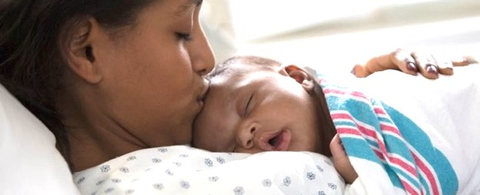BENTONVILLE, Ark.--(BUSINESS WIRE)--By Warren Moore, Vice President, Social Determinants of Health
As a father of four amazing daughters, my wife and I have had the opportunity to create some incredible memories over the years. From attending their dance and athletic competitions to playing video games and visiting national parks in our RV, I will forever cherish the time spent with my family and being blessed with the opportunity to help see my girls grow into smart, courageous young women. While these memories are fond, none compare to the love forever etched in my heart on the day they each were born. I can vividly recall my first time seeing them open their eyes, their tiny hands grasping my finger, their first feedings and the joy I felt seeing them crack their first smiles – what magical times!
For far too many people, their memories surrounding birth is very different. One that many of us could only imagine in our worst nightmares. The United States is the most dangerous place in the developed world to give birth1, particularly if you are a Black woman, according to the March of Dimes. In fact, the Centers for Disease Control and Prevention (CDC) reports that Black women are three times more likely than Caucasian women to die from pregnancy or childbirth-related issues, and there are a multitude of factors, including lack of access to quality healthcare, underlying chronic conditions, institutional racism and implicit bias that led to these disparities. While this issue has plagued the entire country, the University of Georgia reports that Georgia — home to the third-largest Black population in the United States — is the state with the second highest maternal mortality rate.
Since 1994, more than 30 labor and delivery units have closed in Georgia, and more than half of the state’s counties have no OB-GYN care or services1. To address this issue in Georgia, we have teamed up with J&J Consumer Health, home to an iconic portfolio of consumer brands, and CareSource, a national nonprofit that offers health insurance and innovative programs to address health equity and care access, to expand on a joint commitment to improve maternal health. We are beginning with a multi-pronged pilot program in Georgia to address the communities with the greatest need.
Knowing that there are several factors that contribute to the Black maternal health crisis in Georgia, we connected with community members, hospitals and community-based organizations to understand the most pressing issues to address immediately. This pilot is comprised of four pillars:
Self-care support
We are working with J&J Consumer Health to support CareSource’s Mom and Baby Beginnings program, available to CareSource members only, which provides an innovative array of maternity bundles of products, education, and services tailored for Black women and all pregnant people.
High touch pregnancy care
An at-home pregnancy support online through georgiamamacare.com, where mothers can use the platform to get their questions answered through one-on-one telehealth visits with care professionals, specialized classes, and support groups.
Healthcare professional education
Providing healthcare professionals (HCPs) — including doctors, nurses, doulas, pharmacy technicians — with continuing medical education designed to not only strengthen their clinical skills, but also their patient communication, through CME Outfitters Maternal Health.
Health equity research
Our partners at J&J Consumer Health are supporting research led by Morehouse School of Medicine’s Center for Maternal Health Equity to uncover the causes of health inequities among pregnant Black women and how we can further progress community resources to help close the gap.
These resources are available now to expecting mothers and healthcare providers across Georgia. If you are an expectant mother in Georgia and are interested in the pilot program, please visit georgiamamacare.com.
We are committed to making a difference in the health and wellness of our communities, offering quality care to help our customers and patients live better and healthier, right in their communities. We look forward to taking the learnings from this pilot to potentially expand into more communities in the future.

